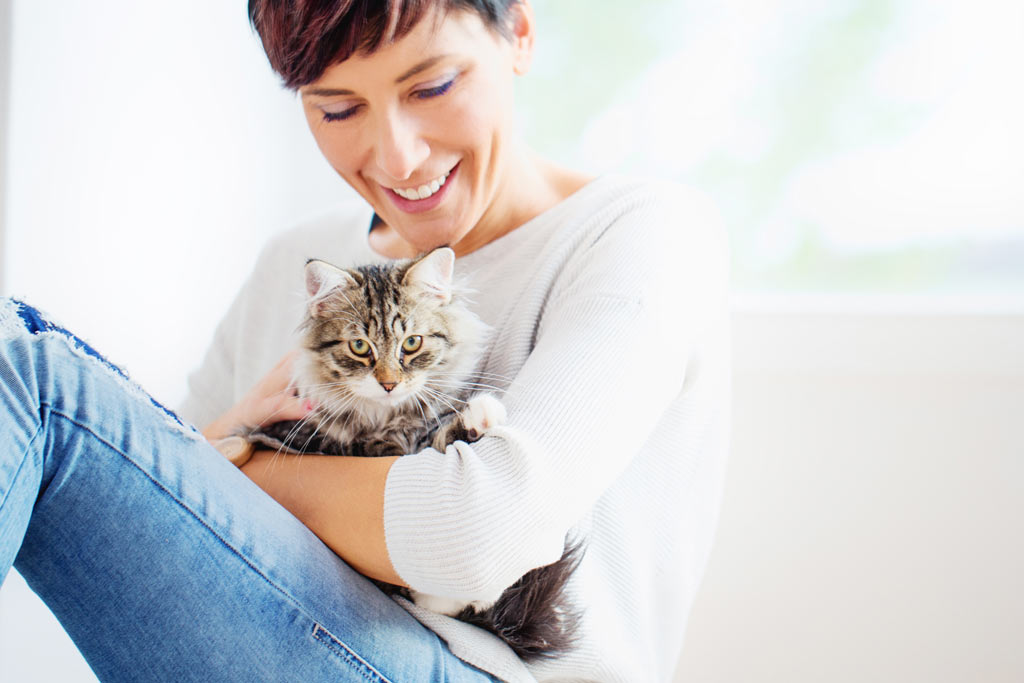- Home
- How to Socialize a Kitten
How to Socialize a Kitten

You've just brought your new kitten home. You're having a great time playing with her, cuddling her, and showing her off to your friends. You're doing important socialization work with her, whether you're aware of it or not. The more you can intentionally tailor your actions to improve your kitten's social skills while she is young, the better.
Socialization Can Decrease Future Problems
A cat that gets great socialization as a kitten can be easier to care for when she is older. For instance, medicating, grooming, and veterinary visits can be quite difficult if a cat is fearful about new people or situations.
Socialization involves exposing a kitten to a variety of people and circumstances while their brain is still developing. This creates positive associations for the kitten and helps her be more outgoing, friendly, and easier to work with.
How to Socialize Your Kitten
Here are some great ways to intentionally socialize your kitten:
- Hold and handle your kitten as much as possible. Be sure to touch her ears, tail, tummy, mouth, and toes because those are areas that adult cats can sometimes resent having handled.
- Practice putting your cat into a carrier and going for a car ride a few times a week. Older cats often dislike these things, so acclimating your cat to them early can really help later on. Feliway, an analog to the pheromone that mother cats emit to calm their babies, can be sprayed inside the carrier before you put your cat in, to help get her used to riding peacefully in the carrier.
- Provide lots of interactive play. One of the best ways to encourage positive behavior is to make sure that your kitten is getting a ton of exercise and specifically has an outlet for her predator instincts. Interactive play, where you use a wand toy to mimic prey bird behavior, is a wonderful way to get that energy out, so your kitten is less likely to engage in unwanted behaviors. Toss toys are great, too, because they allow your cat to run and pounce like they would chase and grab a rodent. Also, always using a toy to play with your kitten, never your hands or feet, encourages proper socialization because it teaches the kitty that it's never acceptable to bite human skin. Remember: never allow your cat to play with strings or ribbons; they are easily swallowed once they get caught on a cat's rough tongue, resulting in the potential for a blocked gastrointestinal tract that requires surgery. Be sure to put wand toys away when you aren't supervising your cat, too, so she doesn't get dangerously entangled in them.
- Host a cat party. Invite people with cats that you know are friendly and healthy to your home. Allow the cats to play together, and reward your kitten with praise and treats.
- Host a regular party. Getting your kitten used to lots of different people and situations is the goal, so regularly create new circumstances to which you can expose your kitten. Having kids play, supervised, with your kitten is a great way to get her used to children, even if you don't have any in your home. Learn more here: "Cats and Kids: Nurturing a Safe Relationship."
- Get your kitten used to noise. You can do this by playing music routinely and using the vacuum or tools around the house.
- Search out a kitten class. These might be more difficult to find than puppy classes but check with your veterinarian to see if there are any in your area.
The easiest time to socialize a kitten is prior to about 12 weeks of age. This seems to be the time when kittens' brains are most open to learning and you can have the biggest impact on promoting friendliness and adaptability.
Unfortunately, this is also before cats are fully vaccinated, so there is some risk to exposing the kitten to lots of people and other cats at that time. Be sure to ask your veterinarian whether it's safe to have your kitten around other cats. Also, choose cats that are themselves up-to-date on vaccines and parasite control to have your kitten around.
Positivity Is the Key to Kitten Socialization
Remember, your goal while socializing your kitten is for her to make positive associations with various people, pets, and events. Be sure that all socialization activities with your cat are positive for her. If she shows fear or reluctance, slow down, increase the distance between her and the object, pet, or person you're exposing her to, and give positive reinforcement for calm behavior.
Never punish your kitten by hitting or yelling if she doesn't respond to new situations the way you'd like her to. That is a surefire way for her to develop lasting negative associations with that thing and potentially with you.
 Loading... Please wait...
Loading... Please wait...




